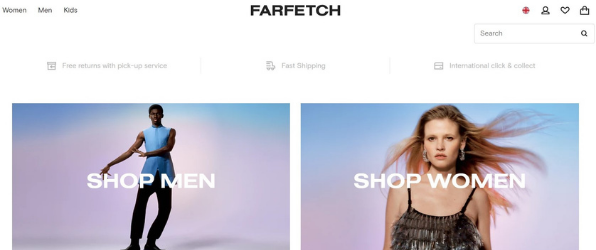April 6, 2022
Retail news and trends to watch out for
- Omnichannel deals. Online luxury retailer Farfetch is to invest up to $200m for a minority stake in US department-store group Neiman Marcus Group, as part of a new partnership between the two companies. The partnership will see Neiman Marcus use Farfetch’s services to ramp up its digital business. For example, the retailer will use Farfetch’s technology to re-platform and power the Bergdorf Goodman website and mobile application. Additionally, Bergdorf Goodman and Neiman Marcus will join the Farfetch marketplace as a partner, thereby adding brands in certain geographies. In September 2020, Neiman Marcus emerged from bankruptcy proceedings after having filed for bankruptcy in May 2020.
- Superdrug’s marketplace model. UK-based retailer Superdrug (A.S. Watson Group) is to launch an online marketplace, which it claims makes it the first high street health and beauty retailer to do so. The platform, set to launch in September, will retail both premium and emerging brands and will be integrated into the existing Superdrug.com website. The company says that the marketplace will enable brands without the infrastructure for a national retail listing to sell through Superdrug. While Superdrug has put a call out for beauty brands, it is also looking for wellness products, including items such as wearables and health testing. The retailer will also focus on Black-owned brands, as part of Superdrug’s Shades of You commitment to diversity in retail in 2021, in addition to female-owned brands and gender-neutral beauty products.
- Happy Returns. US-based beauty retailer Ulta Beauty has partnered with digital payments company PayPal to introduce a return service for online orders in its stores. The retailer will use Paypal’s Happy Returns service to create Return Bars that will launch in 1,300 Ulta stores. Shoppers bring the items to Return Bars, without labels or packaging, and show an employee their QR express code. The store employee then scans the code and verifies the product for exchange or return. The returned products are then placed in reusable totes and shipped to regional Return Hubs for sorting and processing. PayPal claims that, despite the increase in online shopping, consumers have shown a growing preference for Happy Returns’ box-free and label-free drop off. Some 70% of consumers chose to return or exchange a product at a Return Bar rather than returning it by mail when given the option, according to PayPal. The solution is also intended to reduce shipping costs thanks to returns being aggregated into a reusable tote, and be more sustainable by eliminating cardboard and lowering carbon emissions. PayPal acquired start-up Happy Returns in 2021.
- Sephora Dubai. LVMH-owned beauty retailer Sephora has opened a new store in the United Arab Emirates (UAE). The shop is located in the Dubai Hills mall, bringing the retailer’s number of stores in Dubai to 14. Sephora has 97 points of sale in the UAE.
- Chinese retail slows… China’s total retail sales rose 12.5% to Rmb44 trillion ($6.91 trillion) in 2021, according to a report by financial services group DBS Bank. Offline retail sales grew at a slightly faster rate at 13.4% to Rmb33 trillion ($5.18 trillion). However, retail sales growth slowed to 4% year-over-year in the second half of 2021, compared to 23% growth in the first half, weighed down by weakened consumer sentiment and zero-COVID policies to counter Omicron outbreaks in the fourth quarter, says DBS. Store count is expected to grow by between 2% and 4.5% across all major retail categories in 2022, according to the report, with cosmetics’ shops in China forecast to increase by 4%, making it the third largest driver of growth behind clothes and electronics. In terms of retail trends, Beijing, Shanghai, Guangzhou, Tianjin and Chongqing are expected to take the lead in becoming “international consumption center cities,” claims the report. This is due to initiatives such as duty-free policies, visa facilitation to foreign visitors and the construction of business districts. Meanwhile, local Chinese governments’ have adopted a “first store” concept in a bid to attract international and domestic brands to open their first stores in these cities. The concept sees local governments offer tax and financial incentives to brands to stimulate consumption. For example, Beijing aims to attract 3,000 openings of “first stores” and flagship stores from both domestic and foreign brands by 2025. The city is pursuing the goal by granting Rmb5m ($785,755) in rewards to brands that open up shops in the city. Shenzhen introduced a similar policy earlier this month.
- And so does mall development… Shopping mall openings in China are slowing. New shopping mall openings grew 35.1% year-over-year in terms of gross floor area (GFA) in 2021, but fell 7.2% compared to 2019. The GFA growth was the second lowest over the past five years and was 13% lower than the peak in 2017. Developers are focusing on small- and medium-sized malls. Malls under 100,000m2 (1,076,391ft2) accounted for 60% of new mall openings in 2021. DBS predicts that smaller format malls will continue to grow in the future as they can better cater to targeted customer needs.
- Glossier adds to stores. Beauty brand Glossier has opened its fourth brick-and-mortar store. The shop is located in the Miami Design District and is described as Glossier’s take on a beach club. The brand has expanded its store footprint in recent months, with a store in Seatte, a Los Angeles flagship, and another flagship in London. Glossier says it has seen some 250,000 visitors to the Seattle, Los Angeles and London stores since their opening. According to a press release, prior to the pandemic, Glossier said it did 80% of its business through e-commerce and that one million people visited its stores in 2019.

